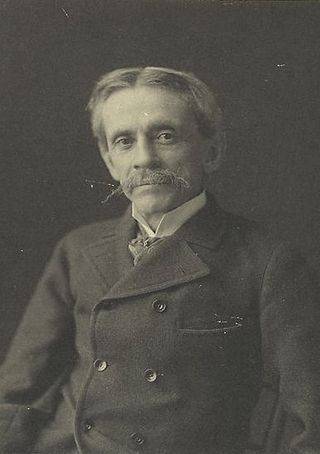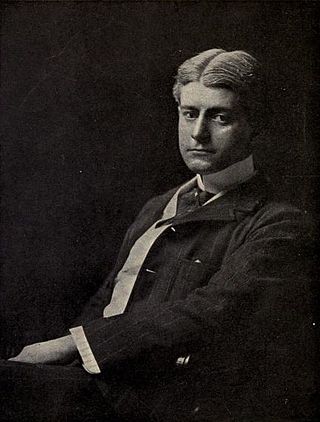Related Research Articles

William Sydney Porter, better known by his pen name O. Henry, was an American writer known primarily for his short stories, though he also wrote poetry and non-fiction. His works include "The Gift of the Magi", "The Duplicity of Hargraves", and "The Ransom of Red Chief", as well as the novel Cabbages and Kings. Porter's stories are known for their naturalist observations, witty narration, and surprise endings.

Frank Richard Stockton was an American writer and humorist, best known today for a series of innovative children's fairy tales that were widely popular during the last decades of the 19th century.

Benjamin Franklin Norris Jr. was an American journalist and novelist during the Progressive Era, whose fiction was predominantly in the naturalist genre. His notable works include McTeague: A Story of San Francisco (1899), The Octopus: A Story of California (1901) and The Pit (1903).

Frank Sargeson was a New Zealand short story writer and novelist. Born in Hamilton, Sargeson had a middle-class and puritanical upbringing, and initially worked as a lawyer. After travelling to the United Kingdom for two years and working as a clerk on his return, he was convicted of indecent assault for a homosexual encounter and moved to live on his uncle's farm for a period. Having already written and published some short stories in the late 1920s, he began to focus on his writing and moved into his parents' holiday cottage where he would live for the rest of his life.

Charles Gilman Norris was an American novelist. A native of Chicago, Norris worked as a journalist for some years before finding success as a novelist and playwright. His first book was The Amateur (1916). His other novels include Salt (1919), Brass: A Novel of Marriage (1921), Bread (1923), Pig Iron (1926), Seed: A Novel of Birth Control (1930), Zest (1933), Hands (1935), and Flint (1944). He also published three plays: The Rout of the Philistines, A Gest of Robin Hood, and Ivanhoe: A Grove Play (1936).

Flora Annie Steel was a writer who lived in British India for 22 years. She was noted especially for books set in the Indian subcontinent or connected with it. Her novel On the Face of the Waters (1896) describes incidents in the Indian Mutiny.
Daniel Gerard Hoffman was an American poet, essayist, and academic. He was appointed the twenty-second Poet Laureate Consultant in Poetry to the Library of Congress in 1973.

The Octopus: A Story of California is a 1901 novel by Frank Norris and was the first part of an uncompleted trilogy, The Epic of the Wheat. It describes the wheat industry in California, and the conflicts between wheat growers and a railway company. Norris was inspired to write the novel by the Mussel Slough Tragedy involving the Southern Pacific Railroad. In the novel he depicts the tensions between the railroad, the ranchers and the ranchers' League. The book emphasized the control of "forces", such as the power of railroad monopolies, over individuals. Some editions of the work give the subtitle as A California Story.

Dame Hilary Mary Mantel was a British writer whose work includes historical fiction, personal memoirs and short stories. Her first published novel, Every Day Is Mother's Day, was released in 1985. She went on to write 12 novels, two collections of short stories, a memoir, and numerous articles and opinion pieces.

The 1909 LSU Tigers football team represented the LSU Tigers of Louisiana State University during the 1909 college football season. The LSU team posted a 6–2 record, losing to Southern Intercollegiate Athletic Association (SIAA) champion Sewanee and to an undefeated Arkansas. Notable victories include those over Mississippi and Alabama.

Samuel Langhorne Clemens , well known by his pen name Mark Twain, was an American author and humorist. Twain is noted for his novels Adventures of Huckleberry Finn (1884), which has been called the "Great American Novel," and The Adventures of Tom Sawyer (1876). He also wrote poetry, short stories, essays, and non-fiction. His big break was "The Celebrated Jumping Frog of Calaveras County" (1867).
Helen Norris Bell was an American novelist and short story author who was Poet Laureate of Alabama from 1999 to 2003. Although most of Norris' work can be considered southern literature she also wrote many stories set in many places around the world, often preferring to write what she imagined to what she knew.

Harris Goodwin Cope was an American football and baseball player and football coach. He served as the head football coach at Sewanee: The University of the South in Sewanee, Tennessee from 1909 to 1916 and Howard College—now known as Samford University—in Marion, Alabama from 1922 to 1923, compiling a career college football coaching record of 48–28–12. Cope was a member of the National Football Rules Committee in 1914–15.

The 1909 College Football All-Southern Team consists of American football players selected to the College Football All-Southern Teams selected by various organizations for the 1909 Southern Intercollegiate Athletic Association football season. Sewanee won the SIAA championship. VPI, an independent school, also claims a Southern championship.

The 1908 College Football All-Southern Team consists of American football players selected to the College Football All-Southern Teams selected by various organizations for the 1908 Southern Intercollegiate Athletic Association football season.

The 1914 Sewanee Tigers football team represented the Sewanee Tigers of Sewanee: The University of the South during the 1914 Southern Intercollegiate Athletic Association football season.
Beatrice Witte Ravenel was an American poet associated with the Charleston Renaissance in South Carolina.

Mollie Evelyn Moore Davis was an American poet, writer, and editor of the long nineteenth century. From the age of 14, she wrote regularly for the press and other periodicals. Though born in Alabama, a critic said of her that she was "more thoroughly Texan in subject, in imagery and spirit than any of the Texas poets," and that scarcely any other than a native Texan could "appreciate all the merits of her poems, so strongly marked are they by the peculiarities of Texas scenery and patriotism." In 1889, Thomas Davis became editor of the New Orleans Picayune.
Jo Mazelis is a Welsh writer. Her 2014 novel Significance was awarded the Jerwood Fiction Uncovered Prize 2015. Her short story collections have been short- or long-listed for prizes, including Wales Book of the Year. She has also worked as a professional graphic designer.

Zoe Anderson Norris was a Kentucky-born journalist, novelist, short story writer and publisher, known for her bimonthly magazine, The East Side (1909–1914), which focused on impoverished immigrants in New York. She also contributed to publications including The New York Times, New York Sun, Frank Leslie's Monthly, Harper's Weekly and Argosy. She investigated journalistic topics including corrupt charity executives and child abuse cases. Her fiction plots often centered around starving artists, women deceived by hypocritical suitors and farmers battling the elements. She founded the Ragged Edge Klub, a group of writers, filmmakers, politicians and performers who met for weekly dinners. She was considered "one of the most popular writers of newspaper sketches in the country" and known as a Queen of Bohemia. An exhibition, To Fight for the Poor With My Pen: Zoe Anderson Norris, Queen of Bohemia, ran March 1-May 13, 2023, at the Grolier Club museum in New York.
References
- ↑ "Frank Norris' "Third Circle."" . The Houston Post. Houston, Texas. June 13, 1909. p. 52. Retrieved October 19, 2017– via Newspapers.com.
- 1 2 "The Third Circle. By Frank Norris". The Spectator. September 18, 1909. p. 25. Retrieved October 19, 2017.
- ↑ "Reviewed Work: The Third Circle by Frank Norris". The Sewanee Review. 17 (4): 501. October 1909. JSTOR 27532334.